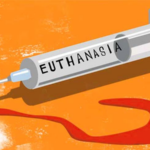Blog Post
UK healthcare system removes the word ‘woman’ from webpages about womb and ovarian cancer
By Jonathon Van Maren
It has been a truly weird experience to watch women being pushed, inch by inch, out of spaces once reserved for them as the transgender movement advances through the culture. In order to ensure that men claiming to be women feel at home in their farcical appropriated womanhood, an entire dictionary of terminology has sprung up to replace the word “woman” and any other word that might indicate that women are … well, women. Thus, we now have “birthing persons.” “Pregnant people.” Women are “menstruators.”
Feminists have been forced to watch their erasure with some measure of horror — but if they protest, they are told they are TERFs (Trans-Exclusionary-Radical-Feminists, which means feminists who do not consider biological men in dresses to be their sisters) and shouted down — sometimes with violence, almost always with ugly threats.
And so it continues. In the UK, where gender ideology spread faster than Covid, the official advice on the websites of the National Health Service (NHS) have begun to excise the word “women” wherever it can be found. According to reportage by the Daily Mail, it is now “missing from the landing pages of three sections explaining cancers only found in biological women.” Information concerning ovarian, womb, and cervix cancers have been disassociated with “women” — despite the fact that only women suffer from these cancers.
Those women, presumably. But we mustn’t upset the dudes in drag playing make-believe, because that would be very insensitive. This might seem like a silly argument over a few edited sentences, but the Mail noted that experts have warned that “the change could actually be dangerous for women by over-complicating health messaging.”
The NHS, which has defended its changes as an attempt to make its public information “as helpful as possible to everyone who needs them,” also changed its website on womb cancer, which initially stated that: “Cancer of the womb (uterine or endometrial cancer) is a common cancer that affects the female reproductive system. It’s more common in women who have been through the menopause.”
These lines were removed in October, and “women” are no longer mentioned.
READ THE REST OF THIS ARTICLE HERE








